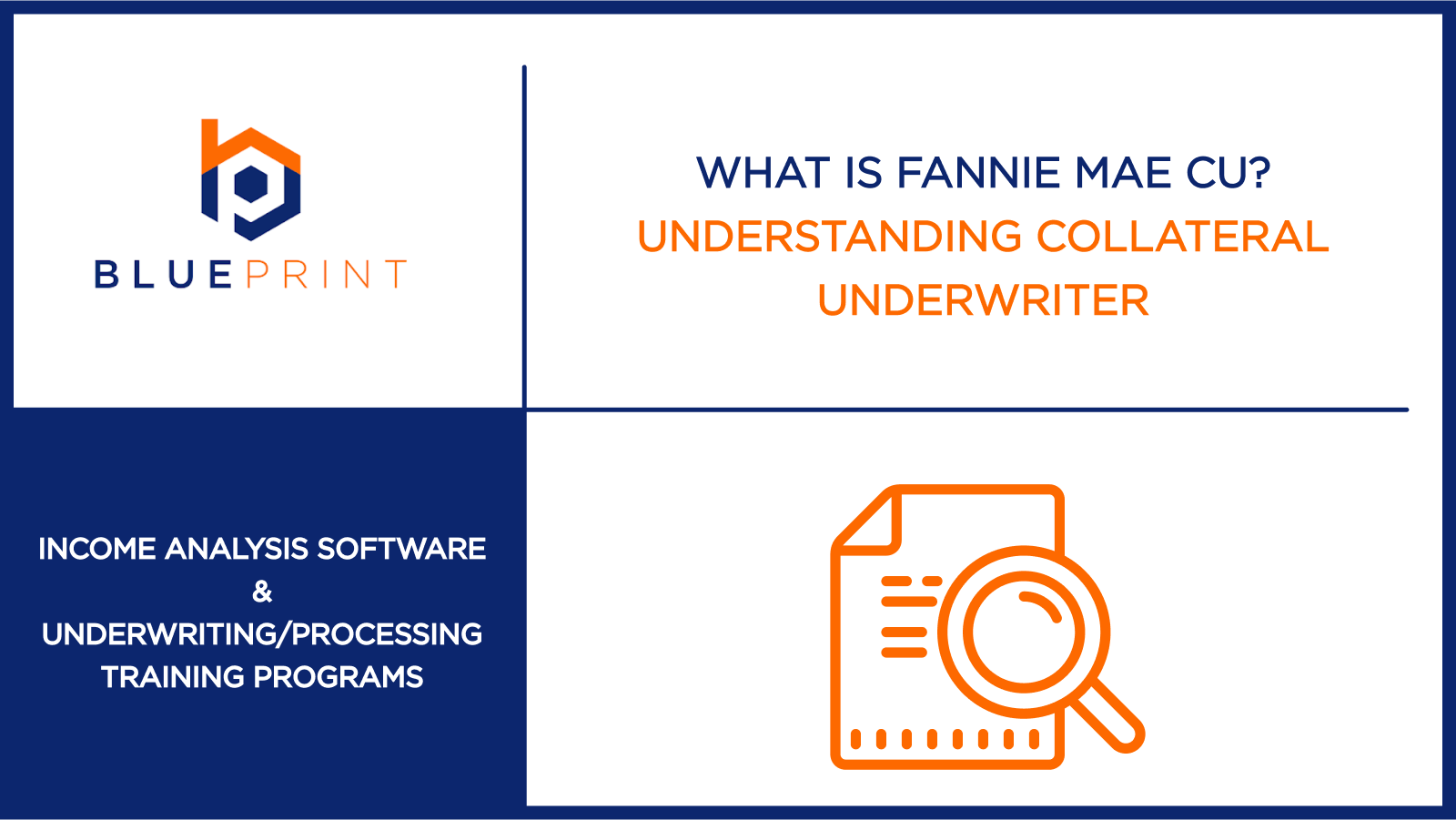As mortgage lending practices continue to change, the need for accurate property valuations has never been more important. To reduce risk and maintain sound lending standards, lenders must ensure that the appraisals they receive are reliable and follow industry standards. As a key part of this process, Fannie Mae’s Collateral Underwriter (CU) provides automated risk assessments of appraisal data.
By leveraging CU, lenders can make informed decisions, minimize risks, and improve loan quality. This post explores how CU works, its importance for lenders, and the complementary role of IncomeXpert in ensuring precise, compliant underwriting.
Main takeaways from this article:
- Fannie Mae’s Collateral Underwriter (CU) is an automated tool that evaluates appraisal data to assess valuation risk.
- CU scores range from 1 (low risk) to 5 (high risk), guiding lenders on necessary further review.
- Lenders use CU to enhance appraisal accuracy, reduce underwriting risk, and improve loan quality.
- CU does not replace human underwriters; they are still required to validate appraisal findings and borrower financials.
- IncomeXpert complements CU by providing accurate income calculations and real-time underwriting advisories.
What is Fannie Mae’s collateral underwriter (CU)?

Fannie Mae’s Collateral Underwriter (CU) is an automated risk assessment application designed to evaluate appraisal data and identify potential valuation risks. It scrutinizes appraisals against a vast database of comparable sales and property data, enabling lenders to make informed decisions regarding collateral valuation.
The primary purpose of this tool is to ensure that property valuations align with industry standards and reflect market realities, lowering the odds of a property being appraised at either a higher or lower value than its true market value.
How does CU work?
CU’s data-rich web application employs advanced algorithms that scrutinize appraisal reports. It analyzes a wide range of data points, including:
- Comparable sales data: CU compares the subject property to similar properties that have recently sold in the area.
- Property characteristics: It assesses factors such as square footage, age, condition, and amenities.
- Market trends: CU considers local market conditions and trends to determine if the appraised value is reasonable.
Here’s a three-step breakdown of how this application typically works:
- Analysis of appraisals: CU reviews appraisal data for consistency with local market trends and comparable properties to confirm that valuations are supported by valid market evidence.
- Assessment of valuation risk: The tool assigns each appraisal a risk score on a scale of 1 to 5. This scoring system enables lenders to easily identify appraisals that may warrant a closer review.
- Real-time risk alerts: CU provides lenders with immediate feedback on appraisal risk. If the risk score is high, CU may flag concerns—such as inconsistencies or weak comparable sales—and surface alternative data. These insights help lenders decide whether to take additional steps, such as requesting more comps or initiating a desk or field review.
How lenders interpret CU scores

The CU score serves as a critical indicator of potential valuation risks. A low score (1 or 2) suggests that the appraisal is likely accurate and reliable. Conversely, a high score (4 or 5) signals potential issues that warrant further investigation.
When an appraisal receives a high-risk score, CU flags areas of concern and may present alternative comparable sales for consideration. Based on these insights, lenders may take additional steps, such as:
- Requiring more comparable sales to support the appraised value
- Conducting a desk review or field review of the appraisal to verify its accuracy
- Obtaining additional property documentation to clarify any discrepancies
These actions help lenders ensure they have a comprehensive understanding of the property’s value before making a loan decision.
Why is Fannie Mae CU important for lenders?
In the mortgage lending industry, accurate property valuation is crucial for mitigating risks and ensuring loan quality. Fannie Mae’s CU plays a vital role in this process by:
Ensuring property valuation accuracy
CU offers lenders an objective, data-backed analysis of appraisal reports, helping to uncover potential errors, omissions, or inconsistencies. This added layer of insight supports more informed decisions and reinforces the integrity of the valuation process.
Reducing underwriting risk
With CU’s capability to assess risk in real time, lenders can greatly reduce underwriting risk. This function is critical for safeguarding against overvalued properties, which can lead to financial losses and regulatory complications.
Improving loan quality and reducing repurchase risk
Accurate property valuations are essential for ensuring loan quality and reducing the risk of loan repurchase. CU helps lenders identify and address valuation issues early in the process, which supports better risk management and stronger overall loan quality.
How CU impacts underwriting and loan approvals

Lenders use CU to assess appraisal risk factors before approving a mortgage. CU flags valuation inconsistencies that may require further review. However, it’s crucial to understand that:
- CU provides a risk assessment for property valuations but does not approve or reject loans.
- Lenders still need underwriters to validate appraisal findings and ensure compliance with agency guidelines.
- Underwriters must still validate borrower financials, credit, and other eligibility factors separately.
- CU does not detect all fraud cases. While it reduces risk, human review is still needed.
CU’s output serves as a valuable tool for underwriters, providing them with data-driven insights that inform their decision-making process. By identifying potential valuation risks, CU helps underwriters make more informed and accurate loan approvals.
How IncomeXpert complements CU

In mortgage underwriting, risk is typically evaluated through the “Three C’s”— Collateral, Capacity, and Credit. Fannie Mae’s CU helps lenders assess collateral risk by analyzing property appraisals—but it doesn’t address the borrower’s financial capacity, which is just as critical to the loan decision.
That’s where IncomeXpert steps in. While CU ensures the property valuation is sound, IncomeXpert focuses on capacity by automating income calculations, verifying documentation, and flagging potential issues before underwriting. This seamless handoff between collateral and income analysis equips lenders with a more complete view of loan risk—and it starts with making income calculations faster and more accurate.
Automated income calculations
Income verification can be notoriously complex. Traditional income assessment methods often involve tedious calculations and data entry, leading to inconsistencies or misinterpretations.
With IncomeXpert, lenders can quickly and automatically compute various income types, such as salary, bonuses, and commission, ensuring that all income sources are accounted for accurately. This automation greatly reduces processing time, leading to faster loan approvals and improved efficiency.
Real-time underwriting advisories
IncomeXpert provides real-time underwriting advisories. This feature allows lenders to receive immediate notifications about compliance issues or potential miscalculations as they occur.
If there are discrepancies in a borrower’s financial documentation, the tool highlights these issues instantly and allows lenders to address them proactively rather than discovering problems later in the process. This real-time feedback is crucial for maintaining the integrity of the loan application and expediting the approval timeline.
Multi-agency support
Fannie Mae has specific income verification requirements that lenders must follow to maintain compliance. At the same time, many mortgage professionals also work with other agencies like Freddie Mac, FHA, VA, and USDA—each with its own guidelines. IncomeXpert is designed to support a range of agency-specific standards, helping lenders stay compliant across all loan programs.
This flexibility streamlines the underwriting process and gives lenders the confidence to manage varying requirements without sacrificing efficiency or accuracy.
AI-powered OCR and human review
IncomeXpert PLUS employs AI technology for Optical Character Recognition (OCR). OCR efficiently extracts relevant data from borrower documentation, such as pay stubs, tax returns, and bank statements. This results in faster processing times and reduces the possibility of human error. The combination of AI and human oversight makes managing borrower income assessments easier.
Seamless integration with Fannie Mae Income Calculator
IncomeXpert integrates with the Fannie Mae Income Calculator, allowing lenders to extract income data from tax documents and submit it directly—no manual entry required. Results and advisories are returned instantly, helping ensure self-employed income is calculated in line with Fannie Mae guidelines.
Improve loan quality with CU and IncomeXpert
Mortgage lending is a complex process and minimizing risk and ensuring loan quality is essential. Together, Fannie Mae’s CU and IncomeXpert offer a robust structure for evaluating and mitigating risks associated with property valuation and borrower financial stability.
CU’s ability to meticulously analyze appraisal data and flag potential valuation discrepancies provides lenders with a critical layer of protection against overvalued or undervalued properties. This ensures that loan decisions are grounded in accurate and reliable property assessments.
But borrower financial stability is equally crucial. This is where IncomeXpert steps in with its automated income calculations, real-time underwriting advisories, multi-agency support, and AI-powered OCR with human review to streamline the income verification process and ensure compliance.
Integrating CU and IncomeXpert lets lenders achieve a comprehensive risk assessment to reduce the risk of loan defaults and repurchases by identifying potential issues early on. Ready to streamline your income verification process and enhance underwriting confidence? Request a Demo today!
Fannie Mae CU FAQs
What is a good CU score?
A good CU risk score typically ranges from 1 to 2, indicating low risk in appraisal valuations. Scores closer to 4 or 5 indicate higher risk and may require further review.
How much does Fannie Mae CU cost?
CU is free for approved Fannie Mae sellers and non-seller correspondent lenders.
Can lenders override CU findings?
Yes, lenders can override CU findings, but they must provide thorough documentation to justify their decision. CU is designed to offer valuable guidance in the appraisal process, and overrides are subject to intense scrutiny, so lenders must be prepared to defend their reasoning.

